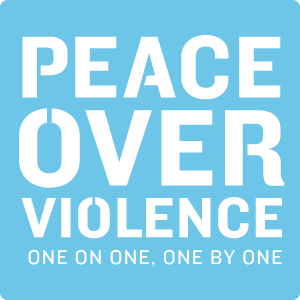Comunidad & Solidaridad in Action: POV's Spanish Speaking Programming Roots
A Latinx Heritage Month Special Blog
Peace Over Violence has a deep history of committed service to survivors of domestic, sexual, and interpersonal violence that spans across five decades. As a survivor-centered and trauma-informed agency, we work with survivors as they take the lead in their own healing; supporting them in addressing their needs and helping them learn the skills that are necessary for them to thrive in their own lives. Our deep history of service is rooted in authentic relationships with community members, including the history and development of the services we offer in Spanish.
Back in 1999 when Peace Over Violence was formerly known as the Los Angeles Commission on Assaults Against Women (LACAAW), two staff counselors named Ana Santamaria and Imelda Talamontes saw the need to outreach to those who have historically been left out of the mainstream anti-rape movement in the U.S.-Latina survivors, especially immigrant survivors and those who are monolingual or prefer to receive services in Spanish.
At that time, there were not many Spanish-speaking survivors seeking support at LACAAW. Although stigma, shame, and misunderstandings of what domestic and sexual violence can look like existed, just as it exists with any community, a major part of the disconnect was that many in the Latino community did not know LACAAW was a free and confidential resource for them as well.
Upon realizing this, Ana brought up the idea to Imelda to conduct in-person outreach in Spanish at various housing complexes in the Pico-Union neighborhood of Los Angeles. Shortly after this conversation, the two began going out in the community and introducing themselves, offering information about LACAAW’s free and confidential services as well as facilitating trainings on domestic and sexual violence.
Over time, Ana and Imelda met so many survivors. Women who have been experiencing domestic abuse for 20 years, 50 years. They met men who experienced rape, but felt pressures to disconnect from their trauma and instead carry on with their lives as if nothing happened.
For many Latinx immigrants, it is often difficult to seek support because there is so much fear- fear of not having support, fear of deportation, fear of their children being taken away if they were to leave their abusive partners.
As they continued with their outreach work, they were able to connect those they met with LACAAW’s services and helped to foster a community of survivors along the way. There was an obvious increase in Latinx survivors calling the hotlines and seeking individual counseling. Soon after, support groups in Spanish began being formed as a way to help foster support networks among survivors- to learn a variety of coping mechanisms, to better understand cycles of violence, and to support each other along the way.
LACAAW’s volunteer program also grew because of their outreach efforts, which gained so much traction and eventually included the promotion of services in different newspapers and television channels, including Telemundo. Ana and Imelda were able to build up the volunteer program as many community members they met wanted to assist Spanish-speaking survivors in their healing journeys via the hotlines and POV’s emergency and intervention services.
Today, the work continues. All of our services are provided in English and Spanish- individual counseling, support groups, accompaniments, etc.- and are offered to anyone, regardless of gender, who have experienced or are experiencing domestic and sexual violence. The number of POV’s support groups in Spanish has increased over the years and are currently facilitated by Ana Santamaria, Marilu Hinojosa, and Rosalinda Mendez year round. In addition to offering support groups with psychoeducational and emotional support tools, the list now also includes a dance class that is run in partnership with Critical Mass Dance Company and spearheaded by Rosalinda.
Each group is like its own safe community where trust is continuously built and maintained collectively by everyone. Confidentiality and authentic connections are high priorities as the groups’ members learn together and engage with various healing activities.
Ana, Marilu, and Rosalinda find so much beauty and power in their work with survivors- witnessing their physical and spiritual healing from trauma is something that they appreciate the most about this work. For Ana, it helps to reaffirm her hope that the work she and her co-facilitators do, helps to one day bring an end to violence in this world. For Rosalinda, her work with survivors helps to maintain her hope for our world; to assist them in having faith in themselves and in their healing. Bearing witness to the learning survivors experience in the support groups- being able to learn things that would never be taught in school and putting them into practice- reinforces Marilu’s hope for more transformation in our world.
Although there is much violence and suffering in our world, healing and transformation are possible through community support and working together, just like the members of our Spanish speaking support groups- working together to heal and transform our lives for the better.
For more information about our services in Spanish, please visit: https://www.peaceoverviolence.org/servicios.


